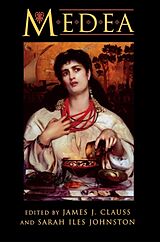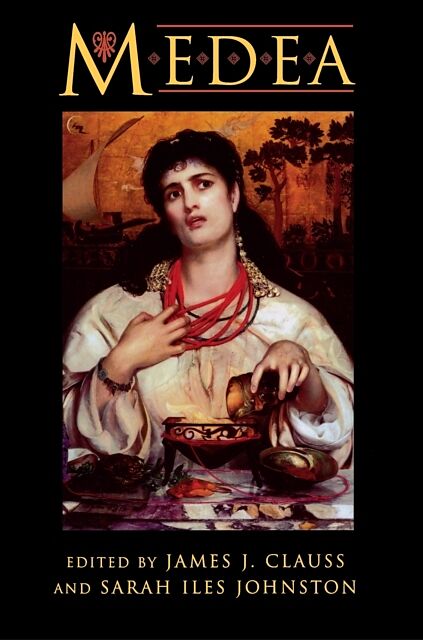Medea
Einband:
Kartonierter Einband
EAN:
9780691043760
Untertitel:
Essays on Medea in Myth, Literature, Philosophy, and Art
Autor:
James J. Johnston, Sarah Iles Clauss
Herausgeber:
Princeton University Press
Anzahl Seiten:
392
Erscheinungsdatum:
12.01.1997
ISBN:
0691043760
Zusatztext " Medea is a model of how one goes about configuring and interpreting any of our long-lasting inheritances from Greek myth.... The richness of its subject should make this book appeal to a wide audience." -Richard P. Martin Informationen zum Autor James J. Clauss is Associate Professor of Classics at the University of Washington and is the author of The Best of the Argonauts . Sarah Iles Johnston is Associate Professor of Classics at The Ohio State University and is the author of Hekate Soteira . Klappentext From the dawn of European literature, the figure of Medea--best known as the helpmate of Jason and murderer of her own children--has inspired artists in all fields throughout all centuries. Euripides, Seneca, Corneille, Delacroix, Anouilh, Pasolini, Maria Callas, Martha Graham, Samuel Barber, and Diana Rigg are among the many who have given Medea life on stage, film, and canvas, through music and dance, from ancient Greek drama to Broadway. In seeking to understand the powerful hold Medea has had on our imaginations for nearly three millennia, a group of renowned scholars here examines the major representations of Medea in myth, art, and ancient and contemporary literature, as well as the philosophical, psychological, and cultural questions these portrayals raise. The result is a comprehensive and nuanced look at one of the most captivating mythic figures of all time. Unlike most mythic figures, whose attributes remain constant throughout mythology, Medea is continually changing in the wide variety of stories that circulated during antiquity. She appears as enchantress, helper-maiden, infanticide, fratricide, kidnapper, founder of cities, and foreigner. Not only does Medea's checkered career illuminate the opposing concepts of self and other, it also suggests the disturbing possibility of otherness within self. In addition to the editors, the contributors include Fritz Graf, Nita Krevans, Jan Bremmer, Dolores M. O'Higgins, Deborah Boedeker, Carole E. Newlands, John M. Dillon, Martha C. Nussbaum, Christiane Sourvinou-Inwood, and Marianne McDonald. Zusammenfassung From the dawn of European literature, the figure of Medea has inspired artists in all fields throughout all centuries. This work examines the major representations of Medea in myth, art, and ancient and contemporary literature, as well as the philosophical, psychological, and cultural questions....
Autorentext
James J. Clauss is Associate Professor of Classics at the University of Washington and is the author of The Best of the Argonauts. Sarah Iles Johnston is Associate Professor of Classics at The Ohio State University and is the author of Hekate Soteira.
Klappentext
From the dawn of European literature, the figure of Medea--best known as the helpmate of Jason and murderer of her own children--has inspired artists in all fields throughout all centuries. Euripides, Seneca, Corneille, Delacroix, Anouilh, Pasolini, Maria Callas, Martha Graham, Samuel Barber, and Diana Rigg are among the many who have given Medea life on stage, film, and canvas, through music and dance, from ancient Greek drama to Broadway. In seeking to understand the powerful hold Medea has had on our imaginations for nearly three millennia, a group of renowned scholars here examines the major representations of Medea in myth, art, and ancient and contemporary literature, as well as the philosophical, psychological, and cultural questions these portrayals raise. The result is a comprehensive and nuanced look at one of the most captivating mythic figures of all time. Unlike most mythic figures, whose attributes remain constant throughout mythology, Medea is continually changing in the wide variety of stories that circulated during antiquity. She appears as enchantress, helper-maiden, infanticide, fratricide, kidnapper, founder of cities, and foreigner. Not only does Medea's checkered career illuminate the opposing concepts of self and other, it also suggests the disturbing possibility of otherness within self. In addition to the editors, the contributors include Fritz Graf, Nita Krevans, Jan Bremmer, Dolores M. O'Higgins, Deborah Boedeker, Carole E. Newlands, John M. Dillon, Martha C. Nussbaum, Christiane Sourvinou-Inwood, and Marianne McDonald.
Zusammenfassung
From the dawn of European literature, the figure of Medea has inspired artists in all fields throughout all centuries. This work examines the major representations of Medea in myth, art, and ancient and contemporary literature, as well as the philosophical, psychological, and cultural questions.
Inhalt
Preface 1Medea, the Enchantress from Afar: Remarks on a Well-Known Myth 2Corinthian Medea and the Cult of Hera Akraia 3Medea as Foundation-Heroine 4Why Did Medea Kill Her Brother Apsyrtus? 5Medea as Muse: Pindar's Pythian 4 6Becoming Medea: Assimilation in Euripides 7Conquest of the Mephistophelian Nausicaa: Medea's Role in Apollonius' Redefinition of the Epic Hero 8The Metamorphosis of Ovid's Medea 9Medea among the Philosophers 10Serpents in the Soul: A Reading of Seneca's Medea 11Medea at a Shifting Distance: Images and Euripidean Tragedy 12Medea as Politician and Diva: Riding the Dragon into the Future Bibliography List of Contributors Index Locorum General Index

Leider konnten wir für diesen Artikel keine Preise ermitteln ...
billigbuch.ch sucht jetzt für Sie die besten Angebote ...
Die aktuellen Verkaufspreise von 6 Onlineshops werden in Realtime abgefragt.
Sie können das gewünschte Produkt anschliessend direkt beim Anbieter Ihrer Wahl bestellen.
Loading...
Die aktuellen Verkaufspreise von 6 Onlineshops werden in Realtime abgefragt.
Sie können das gewünschte Produkt anschliessend direkt beim Anbieter Ihrer Wahl bestellen.
| # | Onlineshop | Preis CHF | Versand CHF | Total CHF | ||
|---|---|---|---|---|---|---|
| 1 | Seller | 0.00 | 0.00 | 0.00 |
